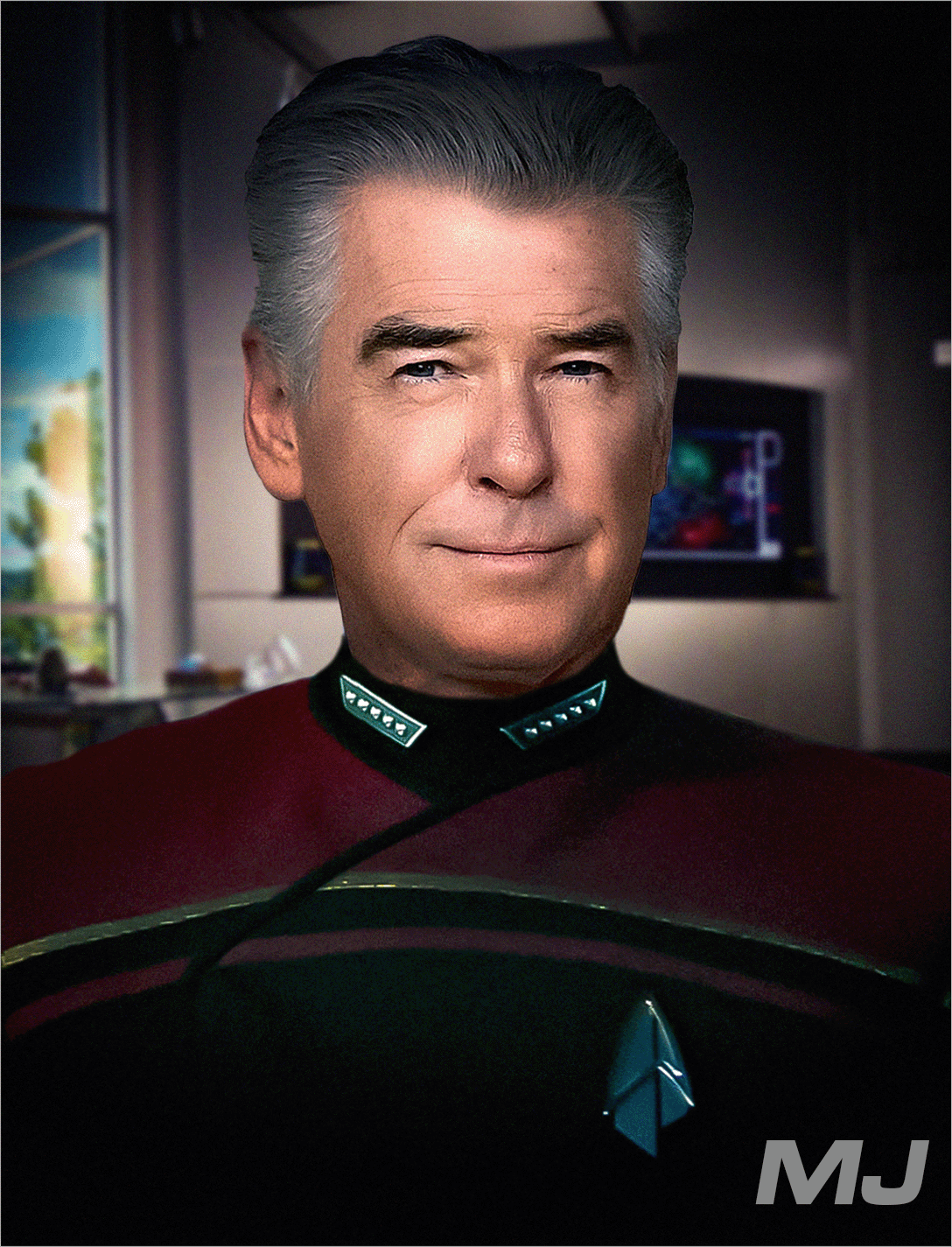As the lights came up in engineering, the design aesthetic from the constitution-class refit era was immediately recognizable. Every surface in the compartment gleamed in brushed chrome or glass, from the multi-level warp core to the dilithium reactor room. Only the modern LCARS interface screens offered pops of colours around the bulkheads of the massive chamber.
“Welcome back to USS Exeter, cadets,” said the disembodied voice of Lieutenant Commander Tallur over the communication nodes. “While the rest of Cadet Squadron Bravo has been assigned to other areas of the ship, you will be responsible for completing safety drills in main engineering. While the Exeter remains docked with Starbase Bravo, your consoles will simulate the starship at flight, in battle, and experiencing engine malfunctions. You will be responsible for maintaining the safety of yourselves, your crew, and ultimately the Exeter. What questions do you have about your mission?”
Horin looked at his fellow cadets, though he had done a few training sessions on the Exeter, he had yet to try anything in engineering. Surpressing his thoughts and feelings around this scenario, he hoped this wasn’t as challenging as the piloting exercise he had completed a month before or the month long survival course on one of the moons in the Mellstoxx system. “Sir,” He spoke up, “will you be assigning a chain of command in this scenario or are we to work as a team to complete our objectives?”
Over the comms, Tallur replied, “Presume the chief engineer is preoccupied on the bridge. You will complete the safety drills as a team. The requirement for a chain of command on that team is entirely up to you, cadet.”
Turning to his fellow cadets, Horin looked at them. “If we want to do well here, then we need someone to coordinate our efforts. What do you all think?” He asked.
Katlyn looked around the room, then down at her own feet for a brief moment before rolling back her shoulders, straightening her back, and looking up at the others. This was not the Katlyn so many were used to. “No argument here. Tate, status on life support and sensors. Nia, warp, impulse and internal power systems and Parze, shields and weapons power.” It was a quick series of commands, said with atypical confidence. “Sooner we know what’s typical, the better we’ll be when surprises start rolling in.”
Lyrakkiton Parze cocked her head to the left in an expression of thoughtful acknowledgement. “Aye, cadet. Good thing for all that velocity practice,” she said, as she searched the archaic engineering compartment for the right console. Once Parze found the tactical systems with her eyes, she stalked over to it. Earnestly, she surmised, “I’m going to have to be fast. Shields are always the first to go.”
Hargreaves had clicked her tongue with bright amusement as Katlyn took charge, and after a moment’s investigation she headed for power and flight systems control. “Shields might be first to go, but being dead in the water’s a great way to get properly dead. So, no pressure on either of us?”
Ominously, Tallur announced, “Your safety drills begin… now,” and the communication channel chirped closed. In an instant, the engine room was transformed: the red alert klaxon cried out, the warp core thrummed and flashed as if the Exeter was trying to fly its way out of a gravity well, and warning lights began to flicker on half of the LCARS panels. Without a full complement of holographic projectors throughout the ship, the deck remained steady and there were no sparks or smoke, but the computer indicators told them a different story.
“Ugh, that’s no fair,” Parze groaned, mostly to herself. Menu options had popped up over half of the tactical systems, suggesting possible solutions for the dysfunction that had already seeped into the Exeter‘s bones. She swiped at the interface, spinning a cutaway diagram of the ship to identify the decks that would soon be in the greatest danger. Much louder, she reported, “Shields are already down to fifty percent!”
“We’re losing main power,” Hargreaves reported with some indignation, obviously displeased at everything going quite so wrong so quickly. “Whatever’s going wrong has busted a conduit on deck 4, so I’m… figuring out a way to bypass that section, I guess. We might have to dance a bit in prioritising key systems until I can get that done.” Her hands jabbed at the controls, at once trying to resolve the issue and coming up against her own incomplete knowledge of the Exeter’s EPS conduit system. “Try to not turn on everything at once for a minute?”
“Life support on deck six is failing, I’m initiating evacuation orders and re-routing power to deck seven.” Horin announced as he whizzed his hands over the console. “Sensors seem to be blinded but some sort of high ionisation interference from whatever has caught us. I’m increasing the resolution to get us a better picture.”
Swiping her hands across her interface, Parze reported, “That interference is draining our shields fast! They’re down to twenty percent.” She had barely said it when another alarm popped onto her display. “Ugh,” Parze groaned, “that overloaded power coupling on deck four is leaking radiation on decks three, four, five and six.” As the local teal-shirt, Parze stepped away from her console to find an emergency medikit; they might need a balm if the situation continued to deteriorate like this.
Katlyn stood there for a moment, staring at the warp core in thought before she turned around to face her fellow cadets. “Gravity means orbits, means whatever is hitting us is coming from one side of the ship more than the other. Work out which side is draining faster and divert power there to buy us time.” She took a few steps over to Nia’s console. “Bring the warp core onto the main power circuits and don’t be afraid to run her up. We need juice and it’s the single best source of power we’ve got.” She blinked, once, twice, then turned to Horin. “Forget life support. We’ll be good for a few hours with a total failure anyway. Divert power to sensors.”
Horin undertook what Katyln said and transferred power as she said, he wasn’t too keen on cutting life support but between their imminent demise and not knowing what was going on, he slightly got her thinking. “Done, sensor resolution is at two-hundred percent.”
That done she finally did what a good engineer should do in a situation like this after triage – find out what the heck is going on. She leaned over the front edge of Nia’s panel to hit the comms button. “Engineering to Bridge, we’re trying to stabilise the ship, but some idea of what’s going on would be helpful. What’s going on out there?” Yes it was a drill, but Engineering didn’t have the same eyes and ears as the Bridge would and taking control of those functions in a disaster would only make things worse, yes?
“Exeter is immobilized,” Commander Tallur replied over the comms. Even through the slight distortion of the communication channel, Tallur sounded perfectly placid. “Our primary hull has been caught in the gravimetric flux of a type-three quantum singularity.”
Hearing that, Horin tried to remember what he had read in his astrophysics class about a quantum singularity. “If we’ve entered a quantum singularity then that must mean we’ve created a hole on entry. The gravitational stress on the ship will only get worse if we remain where we are. We need to find a way out and if I remember rightly, a dekyon beam could help with that.” Horin suggested.
“We need to lighten the load on the impulse engines,” Katlyn muttered to herself. “Lighten the load, lighten the load…static warp bubble?” she asked, looking up from where she was at Nia. “Going to warp would just rip us apart, but you think you can get us a static warp bubble going? Just enough to reduce the ship’s apparent mass and make the engines more effective?”
“A static warp bubble?” Horin questioned after looking up from his controls. “We’ve barely got enough power as it is. The ship won’t last long if we don’t do anything soon though!”
“Okay!” Hargreaves’ hands came up with a hint of an impatient eyebrow. “Less nay-saying, more blowing us up. I think you’re both right, which means we need to reroute any power that’s not going to impulse to the deflector array – and use that to lighten our inertial mass and charge our deflectors with dekyons. So… I just need to give Parze literally every tiny possible bit of power we maybe even have to do five things at once with our crapping out systems?” She was already acting as she spoke, working with utter ruthlessness to reroute power – instead of trying to poorly-maintain several systems at once, giving almost everything they had to one already strained system.
“Come on, come on,” Katlyn said to herself more than to anyone on in particular. “What’s the emergency rating on that thing?” she did ask, louder than before as a hand pointed directly at the warp core. “No, I’ll get it,” she immediately answered as she went for a nearby free console. The ship needed more power, more power meant pushing the ship to the limit, which meant really pushing it to the limit. Hands flew over controls, pulling up information, then control menus and making last-minute adjustments, opening injectors to their design limits to increase matter and antimatter flows, all in the name of harnessing the annihilation reaction at the heart of the ship for every erg of power it could produce.
The thrumming of the warp core provided by the sound effects increased in tempo, as did the lighting. “That’s all she’s got people,” Katlyn finally announced.
“Subspace field-distortion amplifiers are at reading at full power. Forward deflectors are charged with dekyons,” Parze reported, as she manipulated the tactical systems console. She reported, “The additional deflector generators are catching up. Shield bubble is at 65% dekyon char– Ah! We’ve lost the coolant loop on one of the nacelle’s deflector generators. I’m extending deflector fields from the saucer section. Deflectors are… fully charged with dekyons!”
Kaitlyn looked hopeful for just a moment before a deep, groaning noise started to fill Engineering. That reverberating groan of stretching and contorting structural members moving in ways they were never intended to move. Alarms started to sound, piling on top of each other before a final shrill alarm pierced over the top of all others, though it had to contend with the structural ills of the simulated Exeter.
“Warp core containment failure in progress!” the voice said loudly, with a unique klaxon on either end to grab what little attention wasn’t already on it. “Warp core containment…” Then it stopped, all the sounds cleared, the lights returned to normal with a horn announcing the end of the simulation.
“Oh come on!” Kaitlyn was the first to exclaim. “Those…” she instantly deflated from her exclamation, “those injectors could take the load.”
Hargreaves smacked her controls with frustration. “We totally had that,” she agreed indignantly. “What, did we get too inventive or something? We were definitely trying things within protocols!” This last was stated with a conviction that was likely not deserved.
Horin just sighed heavily as he closed his eyes to block out the feelings he was sensing from everyone. He was hearing a lot of the frustration that he shared with them all. Rubbing his forehead, he looked around at everyone else. “Maybe we were trying too hard.” He suggested. Leaning against his console he crossed his arms and was now becoming annoyed with himself for them not passing the simulation. “Or did we miss something?” He wondered aloud.
The communication system chirped, and Commander Tallur announced, “It is unfortunate, cadets, the warp core has breached and the Exeter has been destroyed. …Try harder next time. A full spectrum of sensor composites have been submitted to your servers. For homework, you will analyse the data and determine how the Exeter could have been saved. You are dismissed for the day. Tallur out.”
Her scaly face stretching into a sneer, Parze groaned, “Ugh, we didn’t even make it to the escape pods. That’s grim. I don’t want to be vaporised, you know?”
“New goal,” Hargreaves sighed with growing acceptance. “Next time we die, we leave remains big enough to fill a thimble. Deal?”

 Bravo Fleet
Bravo Fleet














